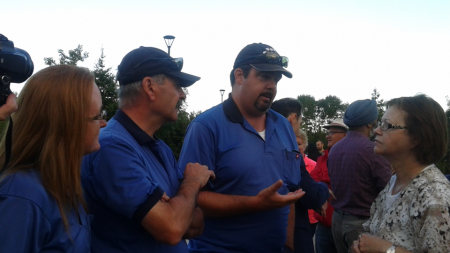Amid an on-going labour dispute the Canadian Union of Postal Workers (CUPW) continues the struggle for a fair contract for their members and a vibrant public service for their customers. The union has been working towards a contract since November 2015 and while in a legal strike position since July 2, 2016 it was the corporation that began issuing notices of potential lock-outs beginning July 5. Over the past several weeks labour rights activists, other public service unions, various branches of government and ordinary folk have been watching as the company and union engage in debate over pay equity, pension structure and expansion of services.
During a press conference in Sudbury held Wednesday July 6 by CUPW Local 612, Executive President Al McMahon stated firmly his members “want to continue serving the public with mail delivery.” Not only that, he reassured residents and business owners of Sudbury, Espanola, Manitoulin and French River, CUPW wants to remain at the bargaining table. “We want a negotiated settlement,” he insisted. In stark contrast all indications suggest the company is determined to force binding arbitration.
McMahon, a 28-year member of the union has been through contract negotiations with Canada Post (CP) several times, most recently in 2011 when after two weeks of rotating job actions the union was legislated back to work by the then-Harper government - a move that just this past April the Ontario Superior Court deemed illegal and unconstitutional under the Canadian Charter of Rights and Freedoms. Labour experts are now watching very closely as the Trudeau government currently sits in a position to uphold its claim of respect for labour and the collective bargaining process.
Not only are the federal Liberals being expected to maintain a ‘hands-off’ approach to labour negotiations but having campaigned in favour of gender equality and retirement security, calls for government accountability on these issues have been made loud and clear. With their postal service seemingly in limbo many people have educated themselves on the issues put forth by CUPW and are lending their voices to a mounting cry for fairness.
PAY EQUITY
This isn’t the first time postal workers have fought for pay equity. McMahon delighted in pointing out the income inequality complaint first filed in 1983 when “Trudeau-senior was Prime Minister.” The complaint, filed on behalf of some 2,300 mostly female clerical workers, was finally resolved in 2011 at the Supreme Court level with a $250 million settlement. It is no wonder CUPW National President Mike Palecek continues to stress pay equity rights are a matter of law and not something to be doled out or withheld under binding arbitration.
This round’s major pay equity negotiation item is on behalf of the rural and suburban mail carrier unit (RSMC) a predominantly (70%) female workforce. They currently earn almost 30% less than urban letter carriers - a workforce comprised mostly of men. The fact that the twenty-two Vice Presidents at Canada Post and President / CEO Deepak Chopra - a Harper-appointee who earns $500,000 plus bonuses annually - refuse to consider an hourly wage for RSMC workers does not sit well with most people.
Labour groups, women’s rights organizations, political parties, major unions including other public service unions, business analysts and ordinary people are alternately calling for Chopra’s resignation and/or demanding ‘Trudeau-junior’ support CUPW’s pay equity demand. They cite labour law and human rights principles, recall campaign promises and remind the PM with a quick quip that this should be a no-brainer ‘because it’s 2016’.
PENSIONS
Al McMahon is not only the CUPW Local 612 Executive President, he is also a letter carrier. When it comes to pensions even he was curious what business analysts mean when they refer to postal workers enjoying “gold-plated pensions”. He said he checked into his current pension situation thinking, “Hey if I have a gold-plated pension I can retire. I can go golfing every day, down south. I can move down there for six months.” He continued with some regret, “It turns out it’s not a gold-plated pension. It’s a plastic-plated pension.”
In reality if McMahon works until 2020, bringing his service commitment to a full twenty-five years, he will likely be eligible for about $24,500 annually making his ‘plastic pension pronouncement’ ring sadly accurate. He went on to concede that postal workers have a modest pension and they believe every worker should have at least that. Unfortunately most do not.
Let’s not remind McMahon that as a result of a Conservative government re-appointment during pre-election 2015 Chopra is guaranteed another five years at the helm - or at the very least a substantial severance package - an arrangement worth a minimum 2.5 million dollars. When asked to resign in December 2015 by the newly elected Liberal government one wonders if Chopra’s refusal to step down was motivated by a need to continue saving for his retirement.
Current Canada Post employees have what is called a defined benefits pension plan with guaranteed payouts based on a fixed interest rate. The union insists future co-workers should be entitled to the same level of retirement security. Federal Liberals campaigned on promises to enhance retirement security for eligible workers and the Ontario Liberals are currently touting similar virtues around the defined benefits pension model.
Canada Post management seeks to impose a defined contributions pension plan on new hires which would not include guaranteed payouts and is tied to varying interest rates based on market fluctuations. Such an arrangement would effectively create a two-tiered pension system within the workforce - something the union will not accept.
Phil Marsh, a postal clerk in Sudbury and Second Vice President of the local executive explained why the union is confident in the existing pension structure. “The corporation is very profitable. When they say they can’t afford the pension this is based on a solvency deficit valuation - if the corporation were to shut it’s doors and have to pay out all workers. We the workers believe Canada Post is not closing it’s doors any time soon.” Equally unlikely is the prospect of all CP employees retiring en masse. The absurdity of either scenario is, unfortunately, a tactic the company is more than comfortable pandering as conceivable to media and the public when they claim pension demands will cost the company one billion dollars. People are becoming increasingly unwilling to continue buying in to this rhetoric.
Not only is the corporation viable, generating profits of $164 million in 2014, $99 million in 2015 and $44 million in the first quarter of 2016, Marsh stated employee contributions currently maintain the pension fund at 106 percent. “When we say we are fighting for future generations we are talking about things like this pension and workers who aren’t even hired yet. Workers in the past fought for gains we all benefit from today. We will do the same with this contract,” he said.
EXPANDING SERVICES
When asked how the union’s desire to expand services is a contract issue McMahon described the link between the closure of some 1,700 post offices across Canada between 1981 and 2013 and the ability to not only maintain a good postal service for the public but to expand into other services such as postal banking. In the past the union successfully negotiated for the protection from closure of 493 post offices. During this round of negotiations they will have to fight for this protection once again. On June 25, 2016 the corporation’s first and final global offer included the following: “Eliminate protection of the 493 Corporate Offices permitting CPC to close all corporate retail facilities.”
Over the past thirty years hundreds of communities have been devastated by the loss of their local post office. Public outcry motivated the federal Liberal government in 1994 to announce a moratorium on post office closures. At every contract renewal CUPW has to continue bargaining against post office closures as well as resist the opening of retail franchises that essentially undermine the company’s own outlets.
McMahon explained, “Each time the company opens one of these small, drugstore wickets they outsource our jobs to differently-skilled workers who are usually in part time, precarious positions earning minimum wage. These outlets look enough like a post office that people don’t even realise how badly the public institution is being eroded. Holding on to the remaining outlets ensures we have viable sites for expanded services such as postal banking.”
Marsh described the prospect of postal banking as very lucrative and something the public is keenly interested in. “Postal banking has been tested around the world and generates enormous revenue for countries such as Switzerland, Italy, France, New Zealand. Even Canada had postal banking up until 1969. The corporation even did a study from 2009 to 2013 and have concealed the details. Our union is demanding the results of that study knowing they represent a win-win situation for the company and the public when it comes to postal banking.”
He continued, “The Canadian Union of Postal Workers’ vision for the post office involves expanding services and generating more revenue - profits that would be kept in the hands of the public and could subsidize social initiatives. This is in contrast though to Canada Post’s vision of cutting door-to-door, closing post offices and cutting jobs. Typically with austerity measures like these the public who use the service pay more for less. That’s needless with the opportunities we have.”
Currently thousands of rural and low-income communities do not have a local bank but still have a post office. The proliferation of predatory lenders is something many feel could be combated with the availability of postal banking. The corporation could also offer federal and provincial government services in communities where these have been reduced or eliminated. Marsh concluded, “People are speaking and they want leadership for this company to promote and grow this public service. It was built by the public and the public are major stakeholders in this. They want leadership that will represent the public’s interest. We have many good ideas to promote the post office and the public service.”
POSTAL REVIEW
When asked how people in Sudbury can show their solidarity with the union McMahon highlighted two options that not only support postal workers but ensure people are fighting for their rights when it comes to maintaining and improving their postal service. “Write to your MP, especially Paul Lefebrve who had a townhall meeting in May to talk about the Liberal government’s public review of Canada Post. People can also write to the public review task force. They want to hear from us, what we want for our postal service.”
A willingness to participate in the public review is seen by many as direct resistance to Canada Post’s on-going agenda of austerity measures and the push towards privatization. McMahon said, “Once the election ended, the public spoke saying they didn’t want any part of that.” He encourages people to continue expressing their disinterest in privatization. He explained Judy Foote, the minister in charge of Canada Post, insists privatization is no longer being considered but the union is not convinced current leadership at the crown corporation has abandoned such plans. He concluded, “We have to remember who owns the post office. It’s the public. It’s all of us. We are the owners of the post office.”
It is a reminder that bears repeating because while the union is once again fighting for a fair contract for it’s members and future employees they are tackling issues that potentially affect everyone. With cautious optimism many people are looking to the Canadian Union of Postal Workers, the federal government and to each other for the kind of solidarity that can ensure continued viability for the corporation but also fulfill a renewed vision for a postal service we can all be proud of.



